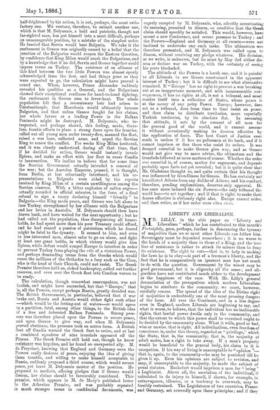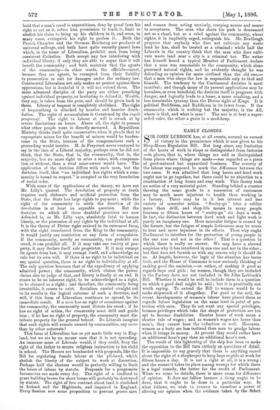LIBERTY AND LIBERALISM.
MR. LILLY, in the able paper on " Liberty and Liberalism " which he has contributed to this month's Fortnightly, goes, perhaps, further in denouncing the tyranny of majorities than we or most other Liberals can follow him. Sovereignty must be deposited somewhere ; it is no worse in the hands of a majority than in those of a King, and the true line of resistance is rather to attack its misuse than to deny its existence. The right to vote—that is, to help in making the laws he is to obey—is part of a freeman's liberty, and the fact that he is comparatively an ignorant man has not mach to do with the question. Government by the wisest may be good government, but it is oligarchy all the same ; and oli- garchies have not contributed much either to the development or the happiness of the race. With Mr. Lilly's general denunciation of the prerogatives which modern Liberalism begins to attribute to the community, we must, however, cordially concur. The spread of the idea of the Divine right of majorities is undoubtedly one of the most pressing dangers of the hour. All over the Continent, and in a less degree even in England, modern Liberals are beginning to say, and what is worse, to believe, that the individual has no inalienable rights, that lawful power dwells only in the community, and that the extent to which this power shall be exercised ought to be decided by the community alone. What it wills, good or bad, wise or unwise, that is right. All individualism, even freedom,of conscience, is, under this theory, regarded as " privilege," which the State, that is, the community, that is, the majority of adult males, has a right to take away. If a man's property would be beneficial to the general body, his claim to it is usurpation. If his way of living is unacceptable to " opinion "- that is, again, to the community—he may be punished till he gives it up. Even his opinions are subject to revision, and may, if unacceptable to the majority, be made the subject• .of penal statutes. Rochefort would imprison a man for " being " a Legitimist. Above all, the unwisdom of the individual, if calculated to do injury to himself, if shown, for example, in extravagance, idleness, or a tendency to overwork, may be forcibly restrained. The Legislatures of two countries, France and Germany, act avowedly upon these principles ; and if they
hold that a man's creed is superstitious, deny by penal laws his right to act on it, refuse him permission to teach it, limit or abolish his claim to bring up his children in it, and even, in many cases, extinguish his right to profess it. Both the French Chamber and the German Reichstag are products of universal suffrage, and both have quite recently passed laws which, in the name of Liberalism, prohibit men from being consistent Catholics. Both accept any law interfering with individual liberty, if only they are able to argue that it will benefit the community ; and both maintain that the agents of the community—in other words, the officials—must, because they are agents, be exempted from their liability to prosecution or suit for damages under the ordinary law. Continental Liberalism not only makes no protest against these oppressions, but is doubtful if it will not extend them. The more advanced disciples of the party are either preaching against individual property, or hesitating to defend it. Wealth, they say, is taken from the poor, and should be given back to them. Liberty of bequest is completely abolished. The right of bequeathing is attacked by heavier and heavier death- duties. The right of accumulation is threatened by the imp& progressf The right to labour at will is struck at by severe limitations on hours. Above all, the right to possess what other people want is directly menaced. A Republican Ministry thinks itself quite conservative when it pleads that to expropriate mines for the benefit of miners would be burden- some to the State, because of the compensations such a proceeding would involve. M. de Freycinet never ventured to say in the face of a Liberal majority, perhaps even he did not think, that the State, that is, the community, that is, the majority, has no more right to seize a mine, with compensa- tion or without, than a rival mine-owner would have. The application of the doctrine differs with each man, but the doctrine itself, that "no individual has rights which a com- munity is bound to respect," is accepted as the very foundation of social order.
With some of the applications of the theory, we have not Mr. Lilly's quarrel. The devolution of property at death requires such elaborate and artificial protection from the State, that the State has large rights to payment ; while the right of the community to settle the direction of its devolution is at least an arguable question. But the doctrine on which all these doubtful practices are now defended is, as Mr. Lilly says, absolutely fatal to human liberty, or the possession of any rights by the individual at all. It is the theory of Divine right revived in its extremest form, with the right transferred from the King to the community. It would justify any restriction or any form of compulsion. If the community, merely as community, can prohibit one creed, it can prohibit all. If it may take one variety of pro- perty, it may declare itself sole proprietor. If it may exempt its agents from law, it may exempt itself, and acknowledge no rule but its own will. If there is no right to be individual on any special question, there is no right to individuality at all. The only question becomes that of the expediency of applying admitted power ; the community, which claims the power, claims also to judge of that, and liberty is finally at an end. It ceases to be an inherent right, to be acknowledged as a right, to be claimed as a right ; and therefore, the community being irresistible, it ceases to exist. Socialism carried straight out to its results is the logical outcome of such a doctrine, and will, if this form of Liberalism continues to spread, be its immediate result. If a man has no right of conscience against the community, the community must dictate his creed ; if he has no right of action, the community must drill and guide him ; if he has no right of property, the community must dis- tribute property for the general behoof. Do Liberals imagine that such rights will remain unused by communities, any more than by other autocrats ?
This form of Liberalism has as yet made little way in Eng- land, but we are by no means sure that it is not spreading.
An immense mass of Liberals would, if they could, deny the right of the father to secure religious instruction to his child in school. The Houses are bombarded with proposals, like the Bill for regulating female labour at the pit-head, which abolish the liberty of the subject to work at discretion. Perhaps half the electors would be perfectly willing to limit the hours of labour by statute. Proposals for a progressive Income-tax are made every day. The right of a landlord to grant building leases for short terms will probably be destroyed by statute. The right of free contract about land is abolished in Ireland and the Highlands, and impaired in England. Every Session sees some proposition to prevent grown men and women from acting unwisely, creeping nearer and nearer to acceptance. The man who shuts his park is denounced not as a churl, but as a rebel against the community, whose rights, it is implicitly urged, extinguish his. Mr. Bradlaugh proposes that anybody who does not cultivate any waste land he has, shall be treated as a criminal ; while half the Liberals in the country think that the man who does culti- vate waste land near a city is a criminal too. The writer has himself heard a typical Member of Parliament declare that a man was responsible to the community, which alone possessed natural rights, and he evidently thought he was defending an opinion far more civilised than the old one,— that a man who obeys the law is responsible only to God and himself. The tendency to the Continental doctrine is most manifest; and though many of its present applications may be harmless, or even beneficial, the doctrine itself is pregnant with danger, and logically leads to a baser, a more crushing, and a less terminable tyranny than the Divine right of Kings. It is political Buddhism, and Buddhism in its lower form. If the community, which is nothing but the majority, is the All, where is God, and what is man ? The one is at best a super- seded ruler, the other a grain in a mud-heap.





































 Previous page
Previous page